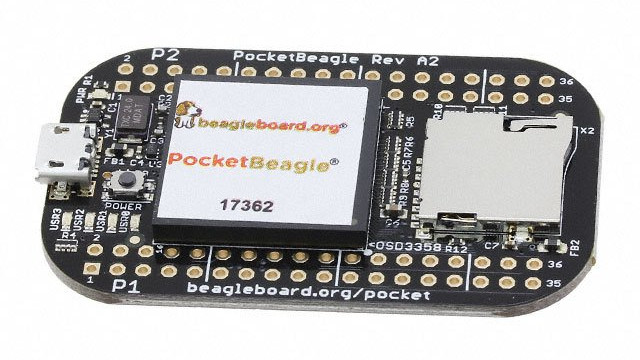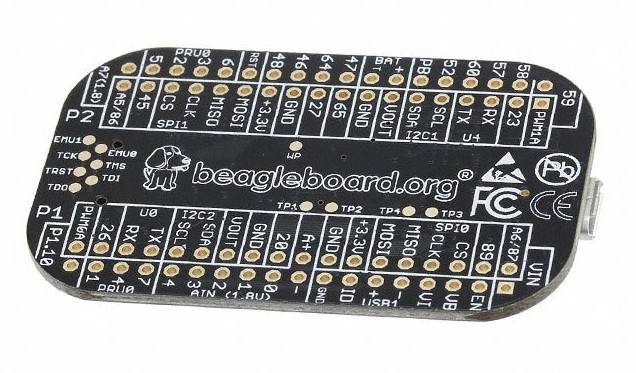Earlier this year, Qwerty Embedded designed PocketBone board, an Eagle & KiCad open source hardware board software compatible with BeagleBone, but much smaller and based on Octavo OSD3358 system-in-package. This was never an official BeagleBoard.org board, and AFAIK it was not made broadly available. But the BeagleBoard foundation has now introduced PocketBeagle with a similar form factor, but based instead on the latest Octavo OSD3358-SM SiP that embeds TI Sitara AM3358, 512MB RAM, a PMIC, and various passive components into a 21×21 package, and exposing more I/Os thanks to 72 through holes.
 PocketBeagle board specifications:
PocketBeagle board specifications:
- SiP (System-in-Package) – Octavo Systems OSD3358-SM with
- TI Sitara AM3358 ARM Cortex-A8 processor @ up to 1 GHz, PowerVR SGX530 GPU, 2x PRU, ARM Cortex-M3 for power and security management functions
- 512MB DDR3 800 MHz
- 4kB I2C EEPROM
- TPS65217 PMIC + LDO with integrated 1-cell LiPo battery support
- Storage – micro SD slot
- USB – 1x micro USB 2.0 OTG port
- Expansion – 2x 36-pin headers (unpopulated) with USB 2.0 OTG, 8x analog inputs, 44x digital GPIOs, 3x UARTs, 2x I2C, 2x SPI, 4x PWM, 2x quadrature encoder inputs, 2x CAN bus, 23x programmable PRU I/O pins, 3x voltage inputs for battery, USB, power line, 2x voltage output (3.3V LDO + 1x voltage input)
- Misc – Power button
- Power Supply – 5V via micro USB port; via expansion headers for LiPo battery, VIN, or USB-VIN
- Dimensions – 56mm x 35mm x 5mm
As with all BeagleBoard.ord board, PocketBeagle is open source hardware, but instead of providing only one source, the schematics and PCB layouts are provided in EAGLE and KiCAD formats, and convertion to web based Upverter CAD tools in progress.
 Software support should be about the same as for BeagleBone Black with official Debian image, Cloud9 IDE, etc.., but there must be some differences, as software status is yet to be updated with most items marked as WiP at the time of writing. You’ll find more info in the Wiki’s FAQ.
Software support should be about the same as for BeagleBone Black with official Debian image, Cloud9 IDE, etc.., but there must be some differences, as software status is yet to be updated with most items marked as WiP at the time of writing. You’ll find more info in the Wiki’s FAQ.
PocketBeagle can be purchased now for around $25 on Digikey, Arrow, or Mouser. Visit PocketBeagle’s product page for more details.

Jean-Luc started CNX Software in 2010 as a part-time endeavor, before quitting his job as a software engineering manager, and starting to write daily news, and reviews full time later in 2011.
Support CNX Software! Donate via cryptocurrencies, become a Patron on Patreon, or purchase goods on Amazon or Aliexpress




